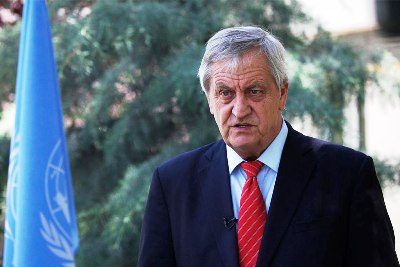UN envoy urges to consider security gaps in South Sudan peace agreement
August 22, 2018 (JUBA) – United Nations Special Envoy for South Sudan and Sudan said there may be a security gap in the revitalized peace agreement related to the protection of the opposition leaders when they return to Juba.

Nicholas Haysom made his concern known last week in an interview with the Peace and Security Council (PSC) Report which publishes reports and analysis supporting the activities of the African Union Peace and Security Council.
Haysom praised the “undeniable progress” achieved in Khartoum in term of the security arrangements and governance issues. However, pointed out to the need to remove the control of security apparatus form any one of the parties in order to create a conducive security atmosphere during the transitional period.
“I am concerned that there is a security gap. There has not been enough reflection on how that will be filled,” he said.
The international official who was alluding to the clashes in Juba in July 2016 further underscored that the United Nations Regional Protection Force (RPF) under its current size cannot contribute to the protection of the opposition leaders and other VIP.
The RPF can only provide these “additional security functions” if it is “supplemented, and a safer environment is created by the terms of the agreement – such as demilitarisation of the urban areas,” he said.
The mediators plan to ask the UN Security Council to allow the 4000 peacekeepers of the RPF to provide bodyguards for the protection of the opposition leaders. The issue has been particularly raised for the protection of Riek Machar who fled from Juba in July under the fire of the forces loyal to President Salva Kiir.
However, the Troika countries, which include two permanent members of the Security Council, warned there would not be an international support to the implementation process unless they are persuaded that there “are clear evidence of the sustainability” of the revitalized peace agreement.
Until then, the parties and the mediation have to take into account this crucial need to ensure the safety and security of the current opposition leaders when they return to Juba to take part in the implementation of the peace agreement.
To make it clear Haysom stressed that he had underscored that “there will not be international support for the outcome of the peace process unless there is clear evidence of the sustainability of any agreements”.
“Sustainability in this context means a number of things: an inclusive agreement, clear evidence of political will on the part of the actors, robust financial transparency mechanisms, effective monitoring enforcement and accountability,” he said.
President Salva Kiir announced his commitment to the revitalized peace deal, saying that this agreement is different from the one of August 2015. he say this time he negotiated the pact while the first had been imposed by the region and the international community.
The parties are now discussing the modalities of implementations which include the protection of opposition leaders.
The mediation plans to conclude the discussions by the end of this month and hold the signing ceremony during the first week of September.
(ST)
